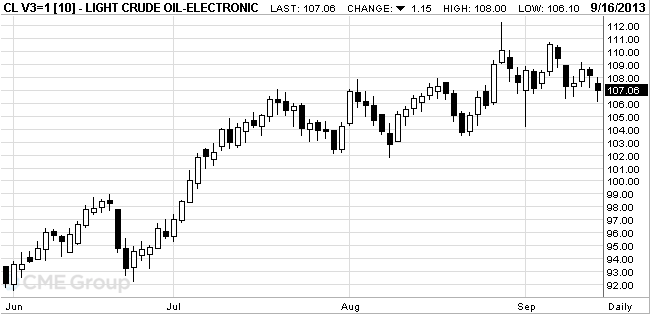- Oil fell to a two-week low
Noticias del mercado
Oil fell to a two-week low
West Texas Intermediate crude declined to a two-week low as a plan to eliminate Syria’s chemical weapons reduced the risk of a disruption in Middle East oil exports.
Futures fell as much as 1.9 percent after the U.S.-Russian accord reached Sept. 14 in Geneva. U.S. Secretary of State John Kerry met with French President Francois Hollande and Kerry’s counterparts from France and the U.K. today to build support for a plan to eliminate Syria’s chemical arsenal. Libya’s El Feel and Sharara oil fields resumed output, the state-run news agency Lana reported.
“The agreement between the U.S. and Russia eliminates any chance of a U.S. military strike on Syria in the near term along with all the spillover concerns,” said John Kilduff, a partner at Again Capital LLC, a New York-based hedge fund that focuses on energy. “This coupled with the return of some Libyan crude production is sending prices lower.”
WTI crude for October delivery decreased $1.32, or 1.2 percent, to $106.89 a barrel at 10:50 a.m. on the New York Mercantile Exchange. Futures touched $106.10, the least since Sept. 3. The volume of all futures traded was 14 percent above the 100-day average.
Brent oil for November settlement fell $1.76, or 1.6 percent, to $109.91 a barrel on the London-based ICE Futures Europe exchange. Futures touched $108.73, the lowest level since Aug. 20. Volume was 77 percent above the 100-day average. The European benchmark traded at a $3.65 premium to November WTI. The front-month contracts were $4.57 apart on Sept. 13.
